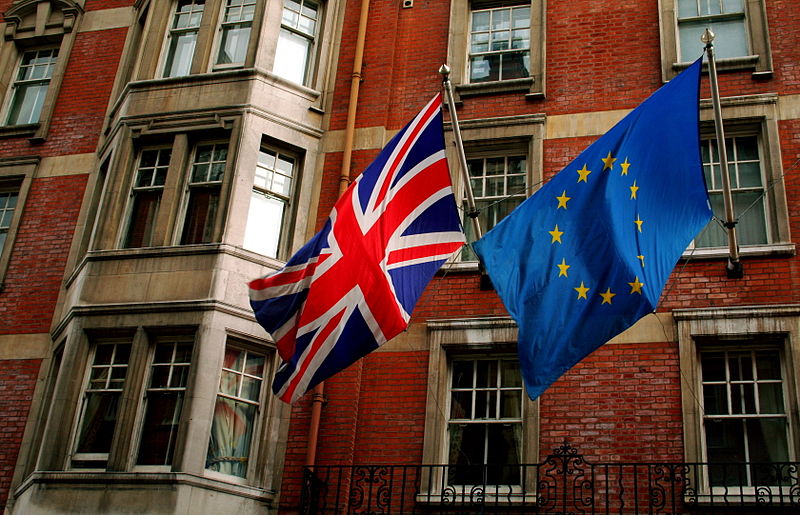“Should the United Kingdom remain a member of the European Union?”
This is the question on which citizens of the United Kingdom will vote on June 23. Historians have actively participated in the debate during the lead up to the national plebiscite. A group of 42 calling themselves Historians for Britain have advocated leaving the European Union, while a much larger group of historians have signed a letter saying that leaving the EU will “condemn Britain to irrelevance.” Given the long interwoven fates of the countries that now make up the European Union, contributions by historians are vital to understanding the geopolitics of remaining or leaving.

On June 23, British voters will decide whether the United Kingdom should remain in the European Union or not. The referendum has popularly become known as “Brexit.” Image credit: Wikimedia Commons
The text that follows intervenes in this debate at the pinnacle of government. Last month historian and Princeton University professor Linda Colley spoke at 11 Downing Street, which is the official residence of the Chancellor of the Exchequer, who is the equivalent in Britain to the Secretary of the Treasury, and a senior member of the cabinet. Colley is one of the foremost historians of the British Empire, nationalism, and identity. Her talk, reproduced here in a slightly edited version, is an excellent instance of the vital role that historians can and should be playing in local, national, and international political debate and policy-making.
One of the most common phrases in the media and in political debate in recent decades has been “Britain and Europe”: a formulation that suggests that these two entities—“Britain” on the one hand, “Europe” on the other—are at once somehow monolithic and also distinct from the other. A Google Ngram search into language usage in these islands demonstrates however that before the Second World War, this phrase “Britain and Europe” was employed far more rarely, and there are good historical reasons why. In messy historical reality, as distinct from much present-day polemic, “Britain” and “Europe” have rarely followed entirely distinctive paths, any more than they have ever either of them been monolithic structures.
To be sure, “Britain” is made up of hundreds of islands, and notions of geographic insularity have been important for British self-imagining. But, for much of human history, travelling by sea was easier and faster than travelling long distances overland, so being geographically insular often worked in practice to facilitate—not obstruct—multifarious British contacts with other European countries. To be sure, too, Britain once possessed a mighty maritime empire, and those Brexiteers who argue that Britain should therefore pursue a variety of global alliances are correct. But onetime maritime empire is actually one of the many things that Britain has in common with many other EU states. Denmark, Holland, France, Germany, Portugal, Belgium all at one time invaded other stretches of the globe. So did Spain, which—before 1800—had a bigger maritime empire than Britain did. By the same token, it is certainly true that Britain has often gone to war with other European states. On occasions—as some Brexiteers point out—this British bellicosity has been in order to prevent a rival European power from becoming over-mighty. Historical accuracy requires us to recognize however that it was sometimes Britain itself that threatened the European balance of power, and that while (along with most other European countries) it has indeed frequently warred with its neighbors, it has usually only done so in alliance with other European powers.
So, since the British past has in these and countless other ways been intermixed with and occurred in tandem with the experiences of other Europeans, why has the binary notion of “Britain and Europe” become so pervasive in recent decades? Part of the answer—in two paradoxical ways—is war. There is no doubt that Britain’s particular experience of the Second World War—its freedom from invasion and its emergence on the winning side—contributed to a sense of distinction from the continent, and made many of its people and politicians react rather differently to post-1945 experiments for European realignment than those Continental Europeans who had experienced defeat and/or invasion. And because the Second World War was one of the last occasions on which Britain played a central role in world history, it has remained an iconic, perhaps overly iconic, ingredient of popular culture and mythologies in that country.
At the same time however—and like other cosseted people in the West—British civilians have been able to become blissfully forgetful about or dismissive of the prospects and meanings of military conflict. Yet, historically, the comparative peace that Western Europe has enjoyed since 1945 is an aberration and cannot be counted on for the future. Even more than economic matters, this seems to me the prime reason why Britain needs to keep close Europeans relations in good repair and strengthen them. It is sometimes argued that it is NATO, not the EU and its predecessors that should be credited with post-1945 peace. But both of these transnational organizations have played an essential role. I must add, as someone who works in the United States, that Britain should not—really should not—discount the possibility of a future President Trump. And he—or so he sometimes claims—is no friend of NATO. But Trump or no, the United States has a long, only partly buried tradition of isolationism and is anyway more and more focused on Asia. It would be unwise therefore to assume that America will always be available to prop up the European powers. Instead, Europeans—including the British—will increasingly need to collaborate more closely to defend themselves.
In some respects, their current level of Euro-skepticism only underlines just how European Britons are. Because in many other parts of Europe, especially at the blue collar level, and especially on the political right, there has also been a rise in recent years in dissatisfaction with the EU and a rise too in nativist passions. This resurgent nativism has been caused in part and generally by unhappiness about immigration and other aspects of globalization. But present-day British Euro-skepticism and nativism also have more specific roots. Since 1945, this polity has experienced both massive change and a dramatic contraction in global reach. Many people have been left feeling disoriented and bereft and in need of a new, energizing start, and such responses easily feed into Brexit. There is consequently a real need for Britain’s leaders and opinion makers to come up with new constructive and imaginative stories of British collective and international purpose and identity. Just as—despite the recent referendum on Scottish independence—the Union will not survive in a happy state unless its rationale and workings can be re-envisioned and re-legitimized, so, by the same token, even if “Remain” triumphs on 23rd June this will hardly be enough.
Men and women do not live by bread alone. They ideally also need sustaining ideas. If we do remain, we need better, and better expressed ideas, not about “Britain and Europe,” but rather about Britain engaging more constructively in Europe.

Linda Colley is Shelby M.C. Davis 1958 Professor of History at Princeton and a fellow of the British Academy. She is the author of six books and many articles, which have appeared in ten languages. Her current work is on the connections between war and the spread of constitutions after 1750.
This post first appeared on AHA Today.
Tags: AHA Today Current Events in Historical Context Europe Global History Political History
Comment
Please read our commenting and letters policy before submitting.






